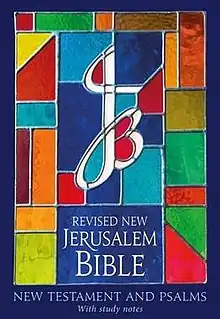Revised New Jerusalem Bible
The Revised New Jerusalem Bible (RNJB) is an English edition of the Bible published by Darton, Longman & Todd.
| Revised New Jerusalem Bible | |
|---|---|
 | |
| Full name | Revised New Jerusalem Bible |
| Abbreviation | RNJB |
| Complete Bible published | 2019 |
| Textual basis | Old Testament: Biblia Hebraica Stuttgartensia with Septuagint influence. New Testament: Novum Testamentum Graece 27th edition, i.e., "NA27." |
| Translation type | Formal equivalence |
| Copyright | 2018, 2019 by Darton, Longman & Todd Ltd |
| Religious affiliation | Catholic Church |
| Website | http://www.dltbibles.com// |
In the beginning God created heaven and earth. Now the earth was a formless void, there was darkness over the deep, with the spirit of God sweeping over the waters. God said, 'Let there be light,' and there was light.
For God loved the world so much that he gave his only-begotten Son, so that everyone who believes in him may not perish but may have eternal life. | |
The New Testament and the Psalms were released in February 2018, with the full Bible released in July 2019.[1][2][3] It is a revision of the Jerusalem Bible and the New Jerusalem Bible undertaken by the British biblical scholar and Ampleforth Abbey monk Henry Wansbrough.[4] Whereas the New Jerusalem Bible and its predecessor the Jerusalem Bible featured the use of Yahweh some 6800+ times for the Divine Name, YHWH, the Revised New Jerusalem Bible reverts to the use of LORD.
Features mentioned by the publishers include the use of gender-inclusive language and the conversion of ancient systems of measurement and timing into modern metric equivalents.[5] The use of ‘shall’ for an emphatic or prophetic future is now rare, being generally replaced by 'will', e.g. in Isaiah 2:2: It will happen in the last day.[6]
Endorsement
The text of both the biblical translation and the accompanying footnotes have been granted Nihil Obstat and Imprimatur endorsements by the Catholic Bishops’ Conference of England and Wales, stating that the Catholic church considers them to be free from doctrinal or moral error.[5]
Criticism
R Grant Jones has criticised the translation for containing a translation of Romans 5:12, with an accompanying footnote, that is in his view heterodox and pelagian.[7]
Eamon Duffy, an Irish historian, criticised the Revised New Jerusalem Bible for being "flaccid" and containing "casual innacuracy"[8] and said that "The English Standard Version is more accurate, and reads better."[9][10]
See also
References
- "The Revised New Jerusalem Bible". Liturgy.co.nz.
- "Revised New Jerusalem Bible: New Testament and Psalms". dltbooks.com.
- Neil Xavier O’Donoghue (18 July 2019). "The Word made comprehensible: is it time to revise the Lectionary?". The Tablet.
- "The Revised New Jerusalem Bible: New Testament and Psalms is an outstanding piece of work by Henry Wansbrough". The Tablet.
- Darton, Longman and Todd Ltd, The Revised New Jerusalem Bible, accessed 2 July 2020
- Bible Readings for Advent and Christmas: The Sunday Mass scripture readings for December 2019 taken from the Revised New Jerusalem Bible, accessed 2 July 2020
- R. Grant, Jones. "The Revised New Jerusalem Bible Study Edition". YouTube.
- [email protected], The Tablet-w:. "War of the Word: top scholars battle over Bible translations". The Tablet. Retrieved 2021-01-05.CS1 maint: extra punctuation (link)
- [email protected], The Tablet-w:. "Losing faith in the Church". The Tablet. Retrieved 2021-01-05.CS1 maint: extra punctuation (link)
- [email protected], The Tablet-w:. "War of the Word: top scholars battle over Bible translations". The Tablet. Retrieved 2021-01-05.CS1 maint: extra punctuation (link)